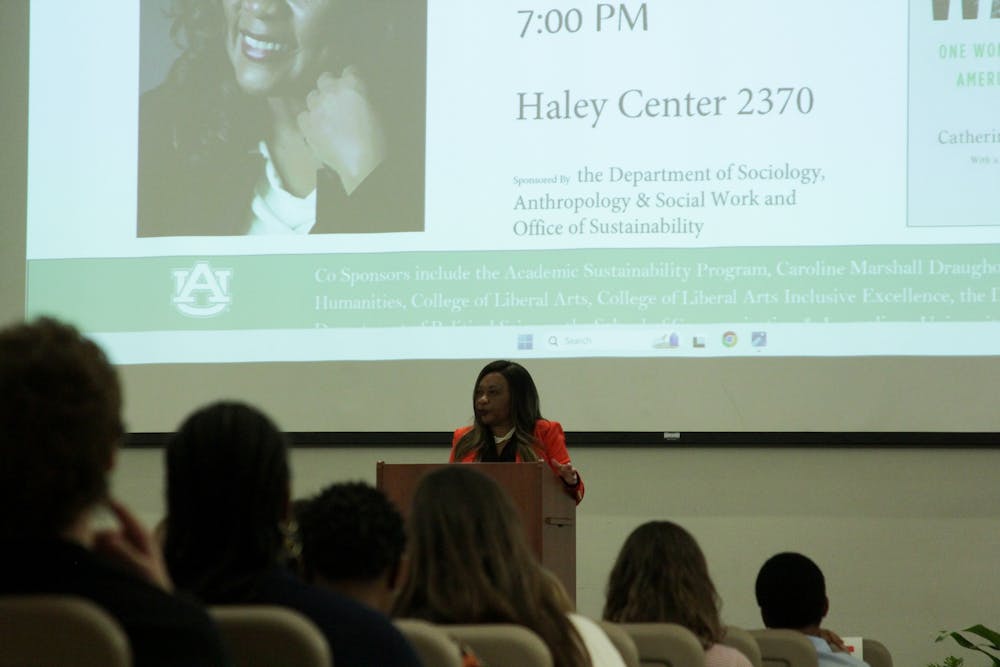On Thursday, Sept. 11, environmental justice activist Catherine Coleman Flowers visited Auburn University to present her book "Holy Ground," in which she discusses the relationship between environmental issues, civil rights, social justice and faith.
Flowers is an Alabama native, an environmental activist and the founder of the Center for Rural Enterprise and Environmental Justice. Through her organization, Flowers advocates for the elimination of health, economic and environmental differences that harm marginalized communities in the state.
On Thursday, a crowd gathered to hear Flowers speak in the Ralph Brown Draughon Library. At the event, Flowers shared the stories behind her collection of essays included in “Holy Ground,” telling personal stories about her mother and discussing her experiences with reproductive justice, her concerns about climate change and the history of the Great Rural Divide.
Flowers was inspired to title her book "Holy Ground" after discovering her connection to the Native American Holy Ground in her hometown Lowndes County, a rural area in central Alabama where poverty and failing infrastructure were rampant. Here, residents used wells for water, which often became contaminated.
Due to growing up in Lowndes County, Flowers recognizes that her childhood gave her a perspective on environmental issues unlike those who don’t see it firsthand. It is this same perspective that Flowers has had trouble getting local and regional policy makers to fully understand.
“A lot of people in these positions never grew up in rural America,” Flowers said. “They haven’t spent a lot of time there, so they can’t articulate solutions without really understanding the problem, and that's the hardest problem is to get them to articulate it through a lens from the bottom up and not the top down.”
Lowndes County is included the Black Belt of Alabama, an area stretching approximately 300 miles across the central part of the state. This region contains numerous counties and is known for its rich soil and history of civil rights activism but also issues with underdevelopment and poverty.
“I think the Black Belt has largely been ignored, especially since it’s no longer the agriculture center of America,” Flowers said. "There’s not as much of a focus on agriculture anymore, and consequently, a lot of those areas have not been invested in.”
Counties like Lowndes and others in the Black Belt aren’t the only ones suffering from this underdevelopment.
“Unfortunately, the issues of poverty, underinvestment and marginalization that exist in the Black Belt also impact communities in Appalachia, the Colonias and rural America at large,” Flowers said. “Clearly, the disparities shape not only health but economic outcomes as well.”
During her lecture, Flowers brought up a train derailment that happened two years ago in East Palestine, Ohio. The derailment caused the contamination of water and left many residents food insecure. The train was also carrying hazardous materials when it crashed, causing the community to express concerns about their health. They were told everything was fine but were left with exposed chemicals that harmed the wellbeing of the community.
Flowers calls on students at Auburn University to recognize the prominence of food insecurity on its campus and how anything can cause this type of situation.
“We have to be mindful of these things, and that’s why paying attention to the environment is so important,” Flowers said.
The experience Flowers has had growing up in these marginalized communities has influenced her journey of environmental justice today. She has been awarded the MacArthur Fellowship and now sits on the board of directors for the Climate Reality Project, the Natural Resources Defense Council and the Center for Constitutional Rights and the American Geophysical Union. Flowers was also appointed vice chair of the Biden Administration’s inaugural White House Environmental Justice Advisory Council.
Despite her concern about environmental issues in communities like those in the Black Belt and worldwide, Flowers has hope for the future because of young people and their involvement in environmental justice.
“I am hopeful, because young people are the future, and they bring new thinking to the old problems. They care about God’s creation and whether or not we deplete our resources," Flowers said. “That makes me hopeful that we will have a sustainable and resilient planet for the future generations.”
Flowers finished her discussion with a book signing opportunity for attendees.
To learn more about Catherine Coleman Flowers and her books “Holy Ground” and “Waste: One Woman’s Fight Against America’s Dirty Secret,” visit her official website.
Do you like this story? The Plainsman doesn't accept money from tuition or student fees, and we don't charge a subscription fee. But you can donate to support The Plainsman.





